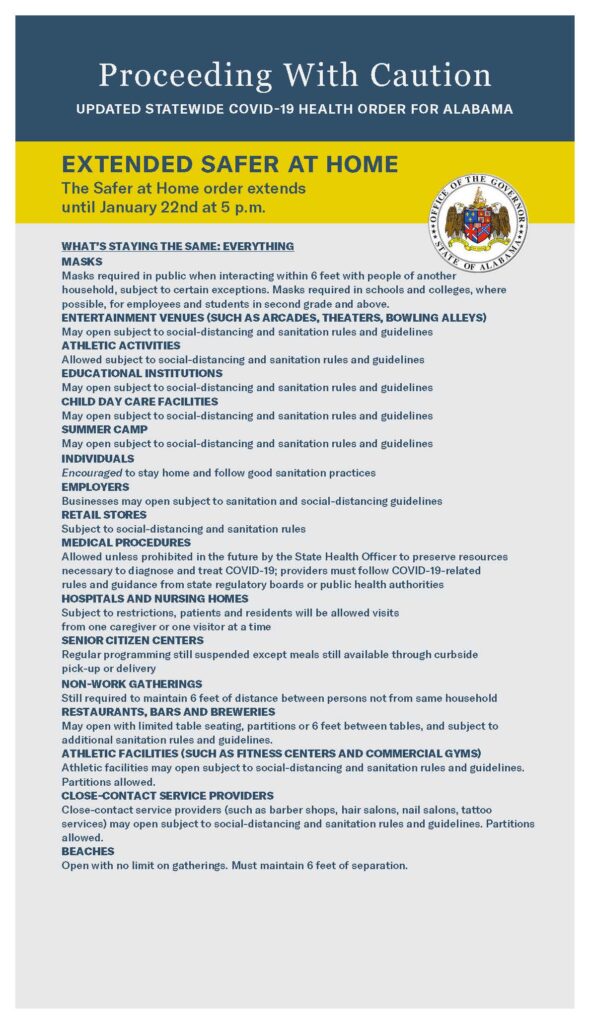MONTGOMERY, Ala. – “Because the pandemic has stretched must longer than we ever imagined, we’re all just downright exhausted by the disruptions to our daily lives,” said Alabama Gov. Kay Ivey in a press conference Wednesday, “and even though the vaccine’s delivery is right around the corner, we shouldn’t lull ourselves into complacency by thinking we’re out of the woods yet.”
Ivey extended the state’s Safer at Home Order, along with the mask mandate, with no changes, until Jan. 22, 2021 at 5 p.m. It had been slated to expire this week.
“These are some of our darkest days since COVID-19 became part of our daily conversations, and the rising number of cases has put a strain on our health care system unlike any time in recent memory,” said Ivey. “Y’all, I’m not trying to be ‘Governor Meemaw,’ as some on social media have called me. I’m simply trying to urge you to use the common sense the Good Lord gave each of us to be smart and considerate of others.”
The bulk of Wednesday’s press conference was some dire words from State Health Officer Dr. Scott Harris, who addressed the current state of the pandemic in Alabama and the timetable for vaccine distribution.
“We really are in a difficult time right now in Alabama. This is a very challenging time, and we’re looking at some pretty dark days for the foreseeable future. As you know, even in the country now, there are numbers that are out of control in many parts of our nation,” said Harris. “Here in Alabama, we’ve reached new numbers of hospitalizations. We’re right at 2,100 people who are inpatients. That’s about 500 more than we were seeing back in July when we were having such a difficult time. It’s significantly higher at this point, and we’re seeing more than 3,000 new cases a day for the past few days. These are not backlogs or data dumps, these are new cases. And finally, we’ve just got to remember we’ve got almost 4,000 family and loved ones and friends who aren’t going to be here this holiday season that we’ve lost so far in our state. If you had a 747 crash every month for the last 10 months, that’s about how many people we’ve lost in the past 10 months in our state.”
But, Harris said, Alabamians do have some cause for optimism with the rollout of the vaccine, the first doses of which are expected to be available in the state next week.
Addressing concerns about the vaccine’s safety head-on, Harris said, “I’ll just say upfront that if it’s approved by the FDA (U.S. Food and Drug Administration) and ACIP (Advisory Committee on Immunization Practices), that gives us all the confidence I need to take that vaccine. I’ll take myself; I’ll recommend it for my family, and I would recommend it to you all when it’s your turn to get the vaccine. We have a lot of confidence in the safety process that they have put in place for that.”
Harris said when the state gets the vaccine, it is expected to be the Pfizer product, which has to be stored at -80°C. He said it is shipped in minimum quantities of almost 1,000 doses, which are recommended to be used within 10 days of the packages being opened. He said there are only a handful of places around the state that can handle those requirements. Approximately 15 hospitals, including Cullman Regional, have been named as locations that will be receiving the initial shipments.
“Once the hospitals get those vaccines and we have the recommendation from the advisory council, the ACIP, we’ll be ready to get shots into arms hopefully that day- that day or the next day. The hospitals will be keeping a portion of their allotments for their own staff, but then they are also going to work with us to reach out to others in that top priority group,” he said. “We can reach the majority of people in our state actually just from these 15 sites alone. The next week, the following week, we expect to have more Pfizer product, and we believe that the Moderna vaccine product will probably start shipping that week as well. The Moderna product is a lot easier to handle in terms of the cold chain requirements; it can go in a regular freezer, refrigerator/freezer that you would find in any pharmacy or doctor’s office or clinic or community health center. It will be able to get to a lot more places more easily than the Pfizer product will.”
Harris said the priority groups Alabama is using are those that were identified by the ACIP. (Find the State’s COVID-19 Vaccination Allocation Plan at www.alabamapublichealth.gov/covid19/assets/adph-covid19-vaccination-allocation-plan.pdf.)
“We are prioritizing those frontline health care workers and those residents of skilled nursing facilities as the Priority 1a population who will be the first to receive the vaccine,” said Harris, who stated the number of health care workers in Alabama is close to 300,000, “so, within that group, we have to do some prioritization of risk. Those who are really on the frontlines and face the most risk will be the first to go. Those are people who work in hospitals. Those are people who work in public health, and in some cases, people who work in certain doctors’ offices or clinics.”
Harris said he wanted the public to be aware that the vaccine rollout will be slow.
“I think the most difficult thing for us to say after waiting all this time is there’s just not going to be enough. There is going to be a scarcity of vaccine, and that’s going to continue for a while. We want people to understand that,” he said. “We fully recognize there are going to be some people at the very tip-top of our priority list who are frontline workers and who are deserving, and they’re not going to get the vaccine on the first day. It’s going to take a little time before we have enough to go around.”
According to Harris, the State expects to receive 40,950 doses of the Pfizer vaccine initially, enough to vaccinate that number of people before the second doses arrive. The Pfizer product is a two-shot series, with the shots administered three weeks apart, so the people who receive the shot the first week will receive their second shots when the second round of doses arrives. He said the State expects around the same number of doses from Moderna, and that product is also a two-shot series, with the shots administered four weeks apart.
Harris said nursing home residents will begin getting the vaccine with the second allotment of vaccine doses, due to the State participating in a federal program using CVS and Walgreen’s to distribute vaccines to nursing homes. He said one-third of the state’s COVID-19 deaths have been nursing home residents.
“We would hope that we could get all of our Phase 1a groups vaccinated within a few weeks, but that mostly depends on what kind of allotment Alabama gets,” said Harris. “I’m sure you’ve seen national stories about the scarcity of vaccines, so we’re still waiting to work that out. We have others in our Phase 1a group like paramedics and EMS, but also other first responders, police and fire and other people who are essential to maintaining our society, and they will all be part of that 1a group as well and will get vaccinated as soon as we have enough to go around for those folks. It will be a little bit longer before the average healthy young Alabamian gets the vaccine unless they’re in one of those essential services.”
He continued, “We think that by the spring there will be a lot of vaccine out there. We will have covered hopefully most of the people in our Phase 1 group and have moved on to others, but it’s likely to be early summer before we have enough for the average Alabamian to receive their vaccine.”
Harris said by that time hopefully people will be able to get vaccinated by their health care provider or at a drug store.
“I appreciate very much what the people of Alabama have done so far,” said Harris. “People have sacrificed so much. It’s been such a difficult year for everybody. I would say everybody knows someone whose been sick from this disease, and most of you know someone whose died from this disease. We still have some tough weeks ahead of us, but I know that we can get through it together if we can hang in a little bit longer. Please remember to stay home if you can, to wear your mask and stay 6 feet away from people if you can’t stay home. Hopefully, we’ll have better news as our vaccine starts rolling into our state.”
Copyright 2020 Humble Roots, LLC. All Rights Reserved.




















